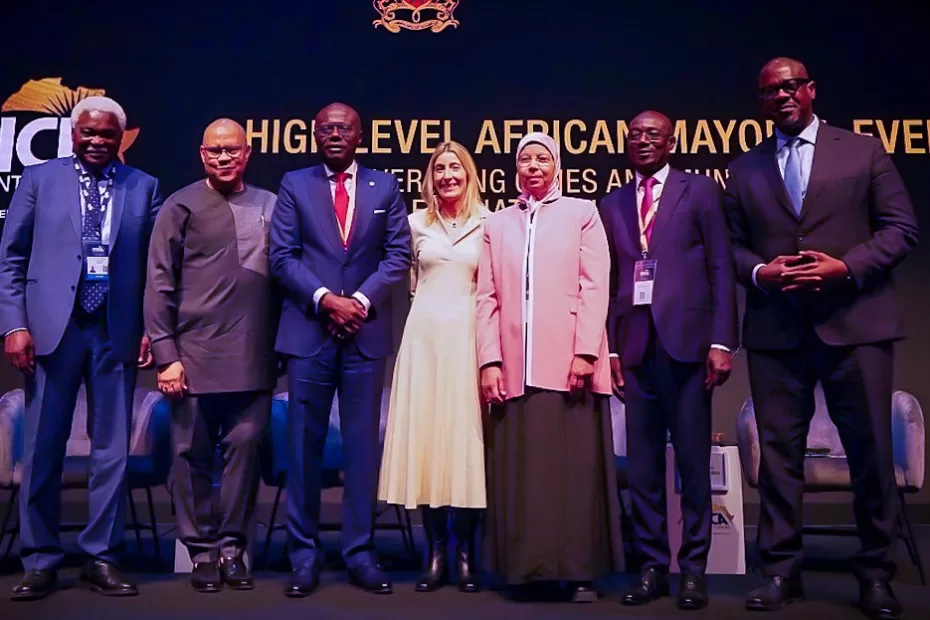African Development Bank (AfDB) President Akinwumi Adesina on Thursday, November, 9 pledged greater commitment to the development of cities as engines of the continents economic growth.
The Bank chief spoke at a high-level forum for mayors titled: “Leveraging Cities and Municipalities for National Development,” held on the sidelines of the Africa Investment Forum 2023 Market Days in Marrakech, Morocco.
The meeting, co-organised by the AfDB and Big Win Philanthropy, brought together mayors and governors of several major African cities. They included Lagos, Dakar, Addis Ababa Abidjan, Kigali and Nairobi, and representatives of governments and financial and development institutions.
AfDB President further states that the new collaboration between cities, states and municipalities together with financial institutions will accelerate development and growth of Africa.
“The Mayoral Forum launches what we hope is the beginning of new collaboration between financial institutions, cities, states and municipalities, to accelerate the growth and development of Africa,”
The session included a presentation on a new report on African cities. The presentation is titled From Millions to Billions: Financing the Development of African Cities.
Speaking on behalf of the Mayor of Marrakech, Deputy Mayor Professor Khadija Bouhrachi said governments needs to invest in services provided by cities.
“While cities are magnets for their promise of higher incomes, governments needed to invest in services, green spaces, highly diversified markets and decent, well-paying jobs,”
Also Read: AIF2023: Unlocking Africa’s Value Chains
From Millions to Billions: new report reveals the challenges and opportunities for Africa
Currently, the findings of the report show dramatically rising population numbers.
African urban population is expected to nearly triple in the next 25 years. Consequently, the population is expected to reach 1.5 billion inhabitants by 2050.
The city of Lagos will be home to approximately 24.5 million people in 2050. These is more than 32 times its size when Nigeria gained independence in 1960, the report states.
To meet this challenge, African countries will have to invest about 5.5% of their annual GDP. These is approximately $140 billion per year.
Dr, Astrid Haas, economist and co-author of the report said the report took a “bottom-up” look at the diverse budgets of 10 African cities.
“Urbanization is the megatrend that is reshaping the African continent, No country has ever developed without an urban plan,” Haas stated
The report further underlines several key strategies for cities. They include creating enabling environments, increasing revenue flows to cities, vision, improving fiscal autonomy and credit worthiness.
Jamie Cooper, CEO of Big Win Philanthropy praised Ethiopia which has been a trailblazer in reducing malnutrition and its mayor Adanech Abebe, who was present, for her role in transforming her city.
In less than a year Addis Ababa has closed more than 100 streets on Sundays to cars. This is for the purposes of children and families to walk and play.
Also Read: Africa Investment Forum showcases $1.5 billion Projects at AfDB 2023 Annual Meetings
AfDB pledges more for cities and urban areas
The AfDB disburses $2 billion per year to projects and programs. The project’s that have a direct positive impact on urban areas across Africa.
Additionally, these projects cover a wide range of areas. The include housing, transportation, access to clean water and improved sanitation and sewage systems.
However, It also has an Urban and Municipal Development Fund (UMDF), which supports 15 cities.
The support ranges from technical assistance, capacity building for integrated urban planning, governance and project preparation. Likewise, it will also support broader urban management, including municipal fiscal management.
The AfDB president further galave some additional good news of approvals by the institution’s Board of Directors.
Moreover, the UMDF, has mobilized $50 million funds for the period 2023-27, that will be directed to support cities and municipalities.
The funds will be divided in a ratio of 60% for urban project, 20% for urban planning. The remaining 20% for municipal access to financial support ecosystems.
The AfDB will provide projected lending of approximately $2 billion in 2024 toward cities and municipalities.
At the same time, he further noted that the Africa Investment Forum will start to prioritize bankable projects. The project’s will help to secure investments for cities.

